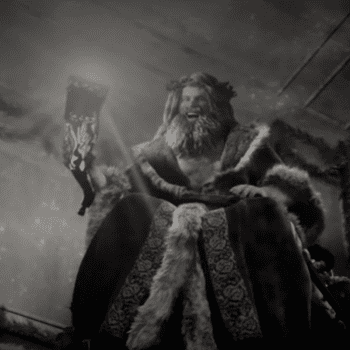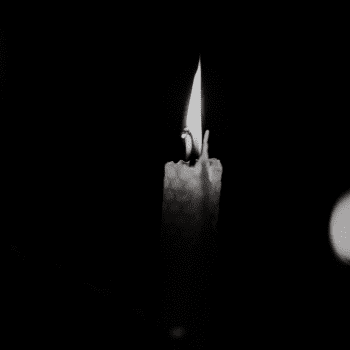I know that Nicholas Cage is “starring” in a summer blockbuster that relies on an inevitable and immanent rapture to scare viewers into theaters, but I’m afraid this little end times ruse needs to stop. It’s time to cancel the rapture.
Really. We’ve milked this biblically suspect, historically bankrupt, literary abomination of a doctrine long enough.
Did we really need a remake of the first Left Behind movie in the first place? Did we even need the first Left Behind movie after the books?
If an action movie relies on any measure of suspense, that’s already gone any way.
RAPTURE MOVIE News flash: people will disappear, stuff will blow up, news reporters will look confused, everyone will get the mark of the beast, and then more stuff blows up. THE END.
And while Christian culture is still gobbling up the latest end times speculation like Four Blood Moons and Perfect Ending, the vast majority of biblical scholars have left the rapture, well, behind. It’s time for the rest of us to do the same before they make the sequel or prequel to the latest Left Behind movie. If anything let’s do this for the sake of Nicholas Cage and the long-neglected American Treasure franchise. It’s what the founding fathers would have wanted.
Here are three even better reasons why the rapture needs to be cancelled:
The Early Church Did NOT Believe in the Rapture
While suffering persecution and expecting the immanent return of Christ, the early church did not expect a rapture, let alone that the rapture can be delayed if they elect conservatives to political office.
Even though Paul wrote about the return of Christ as an event that could happen at any moment, he never advocated for a kind of rapture. Rather, the “caught up into the air” to meet Jesus at his return language is an imaginative depiction of a royal procession (1 Thes. 4:16-17).
Yes, they expected the end to come soon. Yes, they expected to be caught up into the air to welcome Jesus back to earth, but they would also join him on earth to reign with him.
But you know what? A bunch of early Christians also thought that Jesus had already returned because someone TOLD THEM IN A LETTER (2 Thes. 2:2).
Can you imagine the low budget theatrics required for a Left Behind-style movie based on that?
Post men come riding into town like the four horsemen of the apocalypse, people read the letters, the same people become confused and distraught, and then stuff just starts blowing up for good measure.
All that to say, the early church did not believe in the rapture. In fact, the rapture was an invention of dispensational theology in the early to mid 1800’s, and it spread because the Scofield Study Bible included the rapture in its study notes.
In other words, the rapture’s popularity in America is basically the result of marketing.
Conspiracy and Destruction Sell, But They Shouldn’t Preach
I’m always up for a good mystery or suspense novel. I have no bone to pick with folks who turn to the Left Behind books or any other rapture-centered book for entertainment. However, once these plot lines leave our e-readers and book shelves and start worming their way to our pulpits, we have a huge problem.
John didn’t write a letter to the seven churches in Asia Minor in order to predict a terrifying future. They were already being marginalized, imprisoned, and even killed. He wasn’t predicting the destruction of the world. He wasn’t even predicting the legalization of same sex marriage and pot. He was explaining why terrible things were happening to them and promising them a future with justice, peace, and restoration under God’s visible rule.
Rather than passing along a secret code about the future that could only be interpreted through news headlines, he was actually passing along critically important theology. Evil was running rampant in the world, but Jesus had conquered it, is sitting on his throne in heaven, and will one day reward his faithful followers.
Revelation isn’t merely a “revelation of the future.” It’s a revelation of spiritual realities all around us. It’s a revelation of the past, the present, and even some of the future. We destroy John’s message by shoving the rapture and speculation about future events into a series of images and metaphors that were intended to explain why Christians actually needed to stay behind.
The Rapture Undermines the Kingdom Theology of Jesus
In the Gospels Jesus always described the movement of heaven to earth and the coming of God’s Kingdom. He spent his time healing people and casting out demons because he wanted to let the world know there’s a new sheriff in town.
Jesus wasn’t leading a rescue mission from a world that is destined to be destroyed in an end times battle between God and Satan. In fact, it’s far more likely that we’re the ones destroying the world, but that’s a whole other discussion about bowls of wrath and such. Jesus showed us what God’s Kingdom looks like, defeated the powers of evil, sent the Spirit down to his followers, and then sent them out to continue his work.
Revelation is not a narrative about the future, and it most certainly does not contain the rapture. It simply answers the question: Why are Christians suffering if the Kingdom of God has come and Jesus has conquered death. Revelation fulfilled the role of apocalyptic literature in Judaism by encouraging the faithful to persevere in the midst of trying times.
In light of that question, we can see the tensions of the already, not yet Kingdom at play in the various scenes.
The martyrs cry out, “How long oh Lord?”
False prophets and evil empires attack the people of God.
The son of the woman defeats the dragon.
The dragon takes out his fury on the offspring of the woman.
Jesus isn’t distant from this world, and he’s not going to rapture us when things heat up. He’s right in the thick of the battle, standing with his people. In fact, our calling is to go out and bring healing to the nations, welcoming them into God’s Kingdom. The last thing Revelation or any other book of the New Testament, directs us to do is to wait for the rapture to deliver us from the grip of the Anti-Christ, as if we’re spiritual refugees floating on a raft of inerrant scripture.
We’ve been surrounded by anti-Christs and false prophets for centuries now.
We don’t know what the future holds, what the Millennium will be like, or how literal to take the closing portraits in Revelation, but we can at least know one thing for sure about Revelation and the end times: The Rapture Has Been Cancelled.
Learn more about Revelation in The Good News of Revelation by Ed Cyzewski and Larry Helyer.
—

Ed Cyzewski is the co-author of The Good News of Revelation and Unfollowers: Unlikely Lessons on Faith from the Doubters of Jesus. He shares sarcastic/imperfect thoughts on following Jesus at www.inamirrordimly.com.












